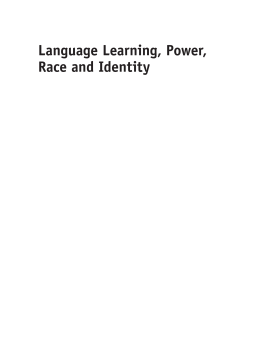
Additional Information
Book Details
Abstract
This book investigates the strategies and identities of colonials who have learned the languages of colonised people, using the context of isiXhosa in South Africa. While power in language learning research has traditionally focused on the powerful native speaker and the relatively disempowered learner, this book studies the inverse, where elites are the language learners. The author analyses the life histories of four white South Africans who acquired isiXhosa during the apartheid years. The book offers insights into relationships between language, power, race, identity and change in their stories and in the broader context of apartheid and post-apartheid South Africa, with its conflicted history and disparities. This book should appeal to researchers interested in studies of language acquisition, narrative and identity, as well as those more broadly interested in South African history, multilingualism and race studies.
Liz Johanson Botha has taught languages since 1968 and held a faculty post at the University of Fort Hare, South Africa from 1998 to 2012. More recently, she has worked as a Research Associate to the Faculty of Education at Rhodes University, South Africa. Her interests include language learning, identity and teacher education.
The stories in this book – stories of multilingualism, race, identity and power – are vividly retold, sensitively interpreted, and are framed by relevant theory. The outcome is an immensely readable and informative work, unique in that it tells readers about the experiences of elites learning an indigenous language in a rigidly divided socio-political context. These stories certainly hit home.
Gary Barkhuizen, University of Auckland, New Zealand
Table of Contents
| Section Title | Page | Action | Price |
|---|---|---|---|
| Contents | v | ||
| Acknowledgements | ix | ||
| Preface: Autobiographical Origins of This Book | xi | ||
| Introduction | xvii | ||
| Part 1 Background | 1 | ||
| 1 The Eastern Cape, Then and Now | 3 | ||
| 2 Life History, Identity and Language Acquisition | 37 | ||
| Part 2 The Life Histories | 65 | ||
| 3 Childhood: Intimacy and Separation | 67 | ||
| 4 Rites of Passage: Paths Diverge | 102 | ||
| 5 Adult Life and Work: Language and Power | 123 | ||
| 6 Identity Across Spaces: White Discourse and Hybrid Space | 155 | ||
| 7 Conclusion | 190 | ||
| Postscript | 201 | ||
| Appendices | 205 | ||
| References | 241 | ||
| Index | 253 |
